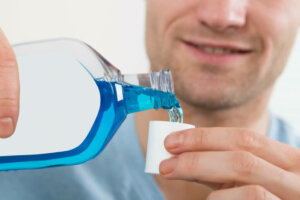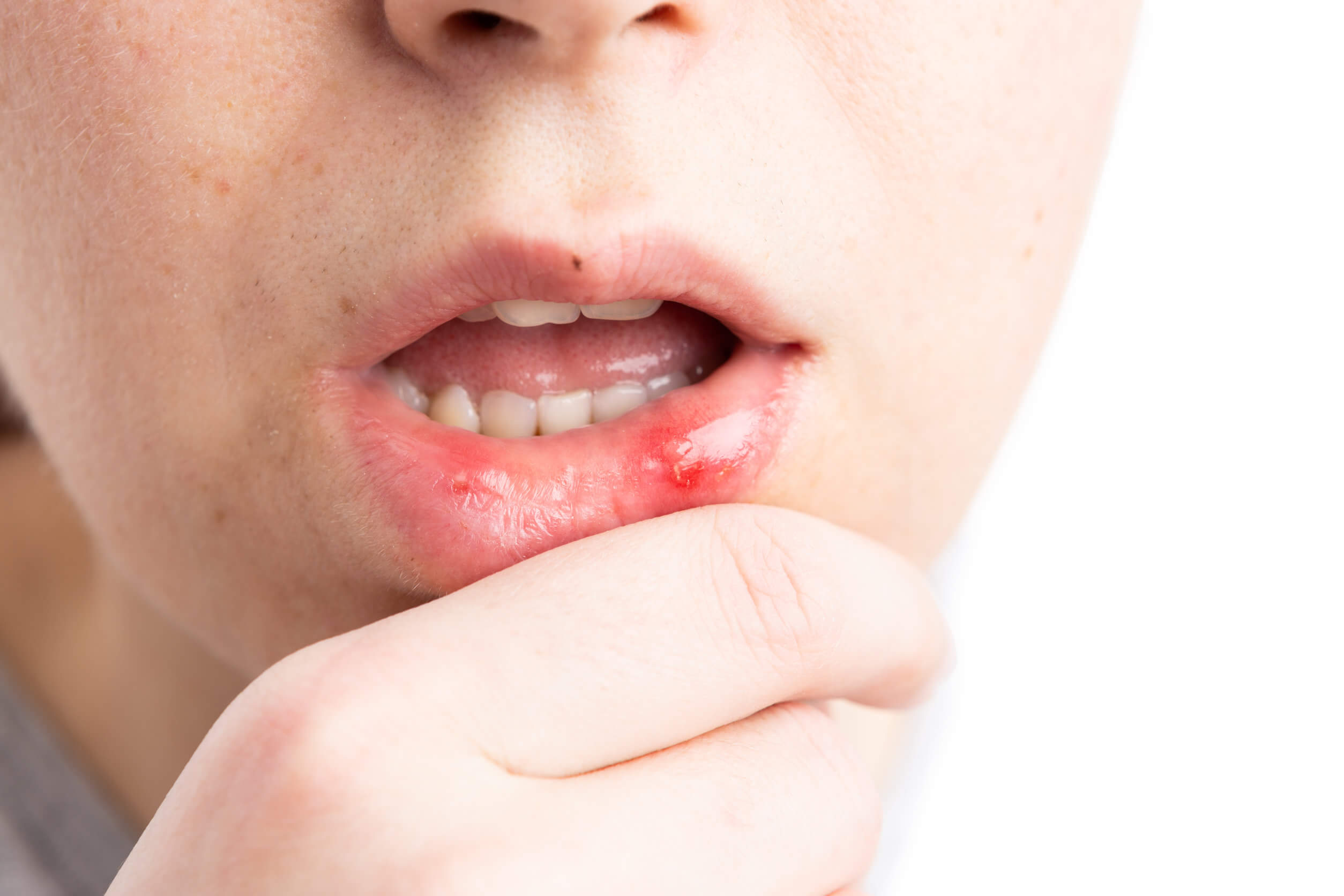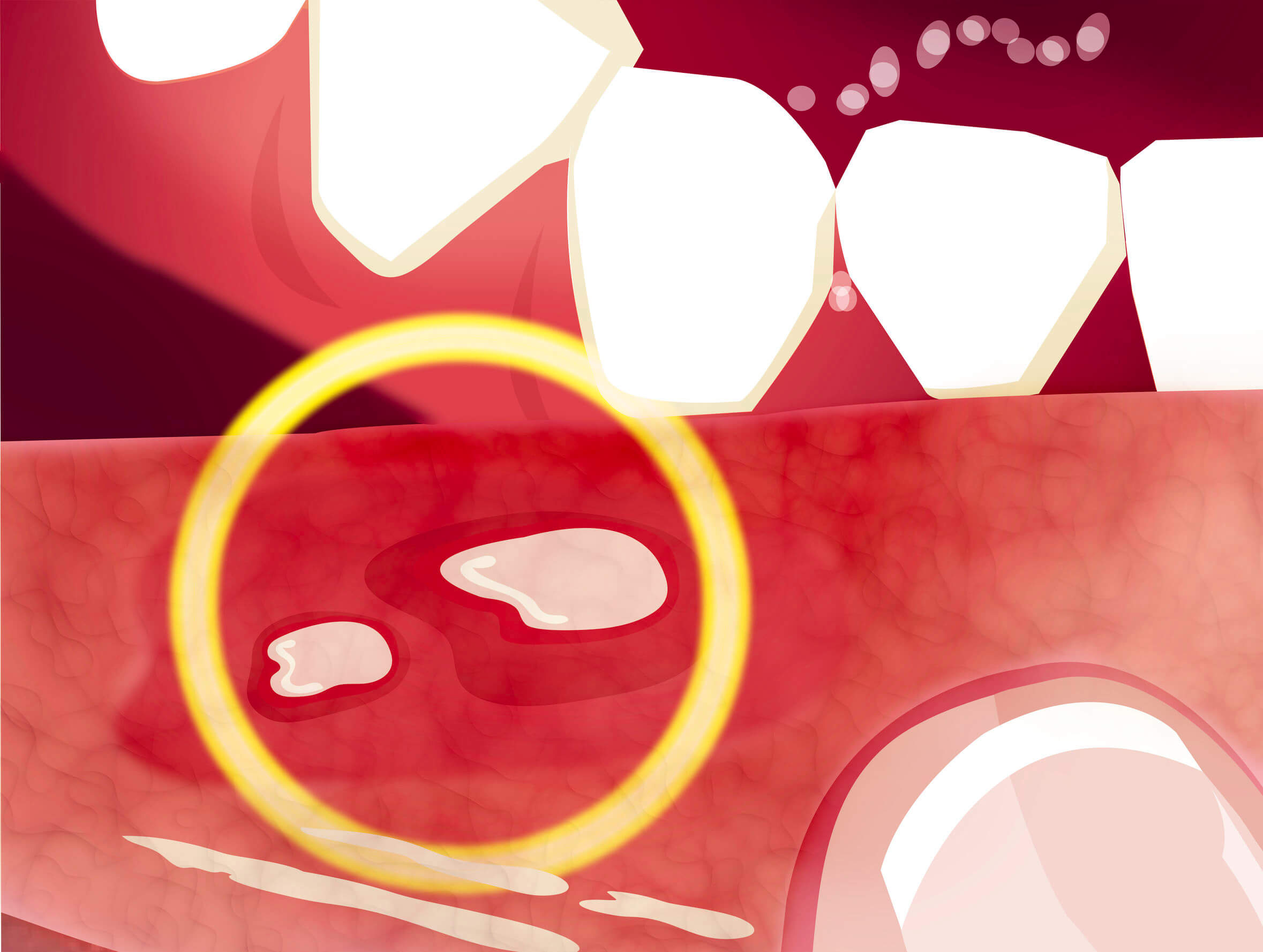How to Heal Mouth Ulcers

Mouth ulcers, also known as canker sores, are relatively common lesions in all ages. They can be very painful, not to mention how they can prevent you from talking and eating freely. Today we’ll show you 6 ways to heal mouth ulcers so that you can deal with this common problem.
Mouth ulcers of this type aren’t contagious and can develop for a variety of reasons. They’re most common during childhood and adolescence, although adults can also suffer from them. They often develop from poor oral hygiene, infections, or an unbalanced diet. Conditions like celiac disease and diabetes mellitus can also favor their development.
6 ways to heal mouth ulcers
In general, mouth ulcers are benign and heal on their own after one to two weeks. It can take a couple of days depending on many factors, and the pain of talking, drinking water, or eating can make you want to speed up the recovery process.
Broadly speaking, mouth ulcers are divided into two types: recurrent and non-recurrent. As you can imagine, treating the first type is a priority, since the time between the healing of one and the appearance of a new one is very short (a couple of days only).
In these cases, experts recommend the use of lasers to immediately reduce the development and growth of mouth ulcers. For the most severe cases, evidence suggests that taking corticosteroids and levamisole may have the desired effect. In any case, we’re going to offer you with 6 ways to heal mouth ulcers that are certainly worth a try!
1. Antimicrobial mouthwash
Since a weak response to bacteria in your mouth is a common cause of canker mouth ulcers, the use of antimicrobial mouthwashes may be a viable option. Researchers have found it effective in reducing the duration of the ulcers, as well as minimizing their recurrence.
That is, if you use this type of rinse you won’t only be able to eliminate the mouth ulcers, but you’ll also prevent them from appearing in the future. Ideally, you should use it twice a day, and, of course, accompany it with proper oral hygiene. It’s very important for the product you use to have antimicrobial properties and for it not just to be hydroalcoholic.
2. Topical corticosteroids

A study published in Acta Otorrinolaringológica (English Edition) in 2008 found that the use of topical corticosteroids can be effective in relieving pain and reducing healing times. It’s a practical, affordable option that will also help you reduce the frequency of the sores in the future.
Experts agree that topical therapy may be the best option for treating recurring mouth ulcers. This is because their side effects are minor and their benefits have been demonstrated by most of the patients who use them.
3. Vitamin supplements
According to some researchers, there’s evidence that vitamin C, vitamin B, zinc gluconate, and lysine taken orally can reduce the healing time of mouth ulcers. This is subject to the condition that it must be taken as from the first or second day of the ulcer appearing. If not, the effects are minor.
There are also indications that carrots, celery, and melon juices can be used as supplemental agents. Although no evidence backs this up 100%, you can use them as a reinforcement method. At the very least, and as we will see later, they’ll help you balance your diet and thus keep your immune system at an optimal level.
4. Turmeric gel
Turmeric has been associated for centuries with anti-inflammatory, analgesic, and antibacterial properties. This led a group of researchers to test the efficacy of turmeric gel for treating aphthous ulcers. The use of turmeric gel reduced pain, inflammation, and lesion size in contrast to the control group (who received a placebo).
You can choose to buy the product at your nearest pharmacy, or apply the turmeric directly to the injury. This would be more of a home treatment.
5. Hyaluronic acid

An article published in the Journal of Drug Delivery Science and Technology in 2020 assessed the efficacy of mucoadhesive buccal films with hyaluronic acid. They found it to be an effective treatment for dealing with these sores as it reduces healing time and recurrence.
Of course, it isn’t a recommended option for treating irregularly manifesting mouth sores. On the other hand, it is for patients who have to deal with them throughout the year. Other hyaluronic acid administration options can also be effective (consult a qualified specialist).
6. Ice
Lastly, you can also use ice to deal with aphthous lesions. It’s a traditional method, very simple, but at the same time practical to deal with them. Ice works by deflating the affected area, reducing pain, and contributing to the healing process. All this means that the injury will heal quicker.
Tips to prevent mouth ulcers
As well as options to heal mouth ulcers that we have pointed out to you, you can implement a series of habits that will help you prevent these sores. Consider the following recommendations:
- Brush your teeth at least three times a day
- Use mouthwash and floss regularly
- Make sure you get at least 8 hours of sleep a day (a lack of sleep can weaken your immune system)
- Avoid stress and tension (they can also affect your defenses)
- Make sure you eat a balanced diet with fruits, vegetables, and legumes
- Avoid eating foods that can irritate your mouth or cause injury (such as pineapples, for example)
- Chew calmly to avoid bite injuries on the inside of your mouth
- Use soft-bristled toothbrushes and, if needed, a tongue scraper.
If these sores appear frequently, despite taking all this advice into account, you may want to consider going to a specialist. Canker sores are benign most of the time, and their triggers can’t always be found, but they are sometimes a symptom of a diagnosable condition (such as celiac disease).
If you wish, you can also use home remedies to heal mouth ulcers. Cold tea bags applied to the ulcer, milk of magnesia, baking soda can bring relief, among others. Avoid trying lots of methods at the same time to ensure you don’t irritate the area with so many different elements.
Mouth ulcers, also known as canker sores, are relatively common lesions in all ages. They can be very painful, not to mention how they can prevent you from talking and eating freely. Today we’ll show you 6 ways to heal mouth ulcers so that you can deal with this common problem.
Mouth ulcers of this type aren’t contagious and can develop for a variety of reasons. They’re most common during childhood and adolescence, although adults can also suffer from them. They often develop from poor oral hygiene, infections, or an unbalanced diet. Conditions like celiac disease and diabetes mellitus can also favor their development.
6 ways to heal mouth ulcers
In general, mouth ulcers are benign and heal on their own after one to two weeks. It can take a couple of days depending on many factors, and the pain of talking, drinking water, or eating can make you want to speed up the recovery process.
Broadly speaking, mouth ulcers are divided into two types: recurrent and non-recurrent. As you can imagine, treating the first type is a priority, since the time between the healing of one and the appearance of a new one is very short (a couple of days only).
In these cases, experts recommend the use of lasers to immediately reduce the development and growth of mouth ulcers. For the most severe cases, evidence suggests that taking corticosteroids and levamisole may have the desired effect. In any case, we’re going to offer you with 6 ways to heal mouth ulcers that are certainly worth a try!
1. Antimicrobial mouthwash
Since a weak response to bacteria in your mouth is a common cause of canker mouth ulcers, the use of antimicrobial mouthwashes may be a viable option. Researchers have found it effective in reducing the duration of the ulcers, as well as minimizing their recurrence.
That is, if you use this type of rinse you won’t only be able to eliminate the mouth ulcers, but you’ll also prevent them from appearing in the future. Ideally, you should use it twice a day, and, of course, accompany it with proper oral hygiene. It’s very important for the product you use to have antimicrobial properties and for it not just to be hydroalcoholic.
2. Topical corticosteroids

A study published in Acta Otorrinolaringológica (English Edition) in 2008 found that the use of topical corticosteroids can be effective in relieving pain and reducing healing times. It’s a practical, affordable option that will also help you reduce the frequency of the sores in the future.
Experts agree that topical therapy may be the best option for treating recurring mouth ulcers. This is because their side effects are minor and their benefits have been demonstrated by most of the patients who use them.
3. Vitamin supplements
According to some researchers, there’s evidence that vitamin C, vitamin B, zinc gluconate, and lysine taken orally can reduce the healing time of mouth ulcers. This is subject to the condition that it must be taken as from the first or second day of the ulcer appearing. If not, the effects are minor.
There are also indications that carrots, celery, and melon juices can be used as supplemental agents. Although no evidence backs this up 100%, you can use them as a reinforcement method. At the very least, and as we will see later, they’ll help you balance your diet and thus keep your immune system at an optimal level.
4. Turmeric gel
Turmeric has been associated for centuries with anti-inflammatory, analgesic, and antibacterial properties. This led a group of researchers to test the efficacy of turmeric gel for treating aphthous ulcers. The use of turmeric gel reduced pain, inflammation, and lesion size in contrast to the control group (who received a placebo).
You can choose to buy the product at your nearest pharmacy, or apply the turmeric directly to the injury. This would be more of a home treatment.
5. Hyaluronic acid

An article published in the Journal of Drug Delivery Science and Technology in 2020 assessed the efficacy of mucoadhesive buccal films with hyaluronic acid. They found it to be an effective treatment for dealing with these sores as it reduces healing time and recurrence.
Of course, it isn’t a recommended option for treating irregularly manifesting mouth sores. On the other hand, it is for patients who have to deal with them throughout the year. Other hyaluronic acid administration options can also be effective (consult a qualified specialist).
6. Ice
Lastly, you can also use ice to deal with aphthous lesions. It’s a traditional method, very simple, but at the same time practical to deal with them. Ice works by deflating the affected area, reducing pain, and contributing to the healing process. All this means that the injury will heal quicker.
Tips to prevent mouth ulcers
As well as options to heal mouth ulcers that we have pointed out to you, you can implement a series of habits that will help you prevent these sores. Consider the following recommendations:
- Brush your teeth at least three times a day
- Use mouthwash and floss regularly
- Make sure you get at least 8 hours of sleep a day (a lack of sleep can weaken your immune system)
- Avoid stress and tension (they can also affect your defenses)
- Make sure you eat a balanced diet with fruits, vegetables, and legumes
- Avoid eating foods that can irritate your mouth or cause injury (such as pineapples, for example)
- Chew calmly to avoid bite injuries on the inside of your mouth
- Use soft-bristled toothbrushes and, if needed, a tongue scraper.
If these sores appear frequently, despite taking all this advice into account, you may want to consider going to a specialist. Canker sores are benign most of the time, and their triggers can’t always be found, but they are sometimes a symptom of a diagnosable condition (such as celiac disease).
If you wish, you can also use home remedies to heal mouth ulcers. Cold tea bags applied to the ulcer, milk of magnesia, baking soda can bring relief, among others. Avoid trying lots of methods at the same time to ensure you don’t irritate the area with so many different elements.
- Abo-shady, A. Z., Elkammar, H., Elwazzan, V. S., & Nasr, M. Formulation and clinical evaluation of mucoadhesive buccal films containing hyaluronic acid for treatment of aphthous ulcer. Journal of Drug Delivery Science and Technology. 2020; 55: 101442.
- Anand, V., Gulati, M., Govila, V., & Anand, B. Low level laser therapy in the treatment of aphthous ulcer. Indian Journal of Dental Research. 2013; 24(2): 267.
- Barrons, R. W. Treatment strategies for recurrent oral aphthous ulcers. American journal of health-system pharmacy. 2001; 58(1): 41-50.
- MacPhail, L. Topical and systemic therapy for recurrent aphthous stomatitis. In Seminars in cutaneous medicine and surgery. 1997; 16 (4): 301-307.
- Manifar, S., Obwaller, A., Gharehgozloo, A., Boorboor Shirazi Kordi, H. R., & Akhondzadeh, S. Curcumin gel in the treatment of minor aphthous ulcer: A randomized, placebo-controlled trial. فصلنامه علمی پژوهشی گیاهان دارویی,. 2012; 11(41): 40-45.
- McBride, D. R. Management of Benign Aphthous Ulcers. American family physician. 2000; 62(1): 149-154.
- Quijano, D., & Rodríguez, M. Topical corticosteroids in recurrent aphthous stomatitis. Systematic review. Acta Otorrinolaringologica (English Edition). 2008; 59(6): 298-307.
Este texto se ofrece únicamente con propósitos informativos y no reemplaza la consulta con un profesional. Ante dudas, consulta a tu especialista.







